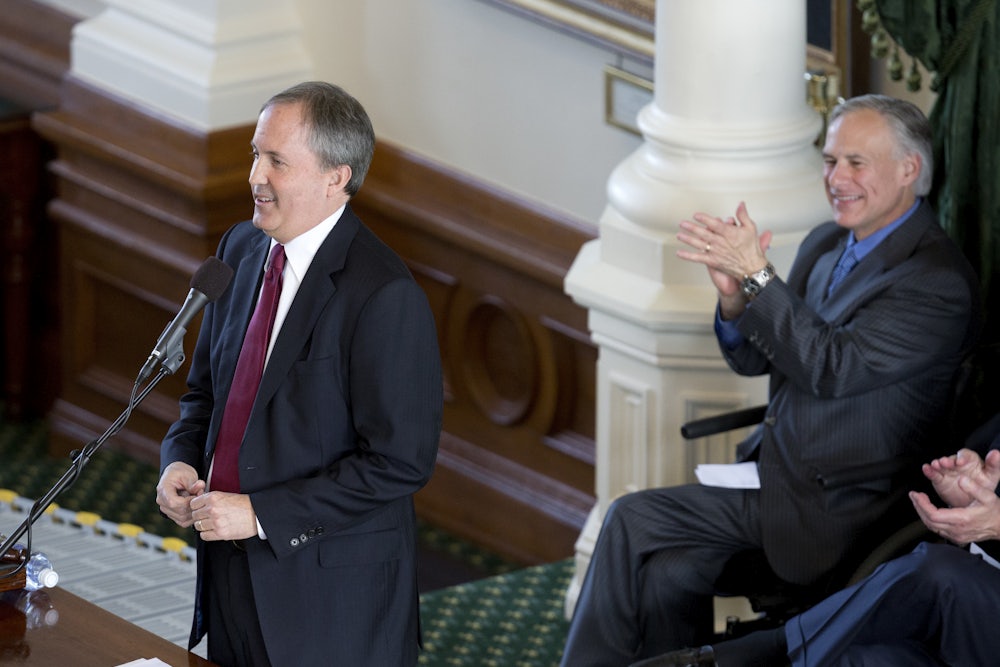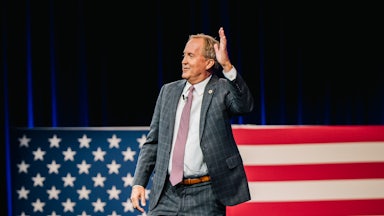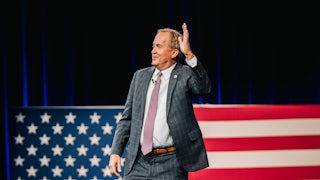The headlines from Texas’s primary election earlier this month did not seem to hold much in the way of banner news for progressives. Representative Colin Allred won the dubious privilege of being the latest Democratic hopeful to bang his head against the iron wall of Ted Cruz’s incumbency; like Beto O’Rourke, he will likely raise Democrats’ hopes and money in equal supply even as Cruz barely deigns to campaign and wins anyway. Beyond that, well, this is not supposed to be a surprise: Texas is full of right-wing Republicans, no?
As it turns out, there are not enough of them—or at the very least, those on hand were not far-right enough, according to many Republican primary voters. Rallied by separate and occasionally competing revenge tours by Governor Greg Abbott and Attorney General Ken Paxton, many of the party’s most dedicated voters followed their urging to oust a slew of objectively conservative politicians who did not fully embrace their particular agendas.
Abbott targeted lawmakers who foiled his well-funded push to institute a school voucher program. One could claim here that Abbott’s motivation related vaguely to some sort of political principle. Granted, the urgency Abbott brought to his payback scheme might have been juiced by the $6 million donation he received from Pennsylvania billionaire Jeff Yass. Yass is a school choice enthusiast and big-time ByteDance investor whose campaign finance largesse may also have been the fulcrum that moved Donald Trump on TikTok’s presence on American phones. Bloomberg has reported that Trump has deemed Yass “in the mix” for Treasury secretary should Trump be elected in November.
Abbott needed only 11 more supporters in the legislature to complete his errand for Yass; he was able to pick up nine pro-voucher challengers outright; he’s managed to push another four into runoff elections.
Meanwhile, Paxton’s vengeance crusade stems from one policy-adjacent concern and another incident whose tenuous relationship to policy is rooted more in pure self-interest. As to the former, Paxton barnstormed the state for candidates to replace the eight members of the state Court of Criminal Appeals who blocked Paxton from pursuing a minor voter fraud case (17 votes in an election won by fewer than 100) over three years ago (Paxton is nothing if not patient). He succeeded in upsetting three of them. His other vendetta stemmed from those House members who voted for his impeachment last year. This might seem like a matter of simple ideological alignment, but votes ultimately turned on whether legislators believed Paxton accepted a bribe from an Austin real estate investor to help shield that investor from an FBI investigation. Most of them did—including Dean Phelan, the Republican House speaker.
Paxton campaigned against more than 30 incumbents who voted for his impeachment. Eight challengers won, and nine are now in runoffs, including Phelan, who came in second to the Paxton-backed David Covey. Phelan will become the first House Speaker in 52 years to lose his primary reelection race.
Of the two revenge tours, Abbott’s had the most success, while Paxton’s was the most aggressively self-centered. In some races, the two men’s interests aligned. Across the state, insurgents benefited from these twin calls for vengeance. The spectacle of state leaders in the same party dueling with each other via local primaries broke with decades of precedent. Some outlets described the contest as one between conservatives and “the ultraright,” and it’s perhaps tempting to think Texas voters showed some measure of restraint. In any case, these elections were not a contest for “the soul” of the party or some kind of referendum on its direction.
Aside from the specific points on which Paxton and Abbott judged candidates’ acceptability—their unique allegiance—there is almost no ideological daylight between any of them. They are uniformly anti-abortion and, with one exception, against any form of gun control (the one guy who voted a gun control bill out of committee has been forced into a runoff). Phelan once seemed less committed than the rest of his party to terrorizing queer people but, mayhap due to the pressures of this campaign, has since come out in favor of bills targeting trans athletes.
Indeed, Paxton and Abbott took pains to paint their preferred candidates as further to the right than the incumbents; what matters is that Texas has seen a mass mobilization of resources on the state and local level to move the party in line with the whims of two specific people. And while it’s indisputably true that relationships have always greased the skids of politics, what’s new here is that Texas Republicans are policing their party membership based on the personal animosity of a few soi-disant kingpins. This is the true legacy of Trumpism and a blow to the democratic process as troubling as any specific legislative agenda.
If the GOP is truly becoming something that marches under the banner of a con man with a bevy of criminal charges nipping at his heels—that is to say, a crime cartel—it’s all but inevitable that he’ll be followed not just by those aping his neofascistic policies but would-be kingpins bent on recruiting their own army of “made guys”—all without much thought to ideology beyond the broadest strokes. This new Republican Party seems much less beholden to an absolute fealty to shareholder capitalism, to say nothing of the old purity tests that party machers such as Grover Norquist and the doughty free-market musketeers of the American Enterprise Institute once forced Republicans to pass. This old guard has begun to give way to more uncanny fellows: Christian nationalists, civil rights griefers, and Proud Boys patrolling our racial and gender divisions.
Above all, this party seems less and less concerned with the ideals that have traditionally defined conservatism: a fealty to founders and institutions and a desire to safeguard the hearty foundations upon which the nation was built against the abrasive winds of change. In place of these duties, today’s GOP is seeking out new figures around which personality cults might be built. To the extent there may one day be a Trump-size hole in that firmament, Texans Abbott and Paxton have gotten a head start in this race into the abyss.










